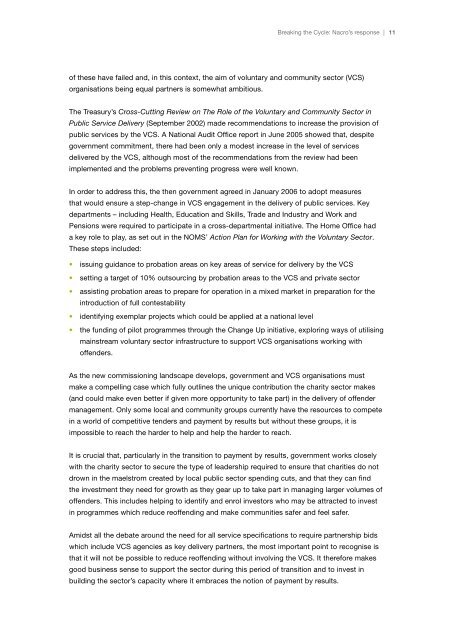Nacro's response to Breaking the Cycle Green Paper
Nacro's response to Breaking the Cycle Green Paper
Nacro's response to Breaking the Cycle Green Paper
Create successful ePaper yourself
Turn your PDF publications into a flip-book with our unique Google optimized e-Paper software.
<strong>Breaking</strong> <strong>the</strong> <strong>Cycle</strong>: Nacro’s <strong>response</strong> | 11of <strong>the</strong>se have failed and, in this context, <strong>the</strong> aim of voluntary and community sec<strong>to</strong>r (VCS)organisations being equal partners is somewhat ambitious.The Treasury’s Cross-Cutting Review on The Role of <strong>the</strong> Voluntary and Community Sec<strong>to</strong>r inPublic Service Delivery (September 2002) made recommendations <strong>to</strong> increase <strong>the</strong> provision ofpublic services by <strong>the</strong> VCS. A National Audit Office report in June 2005 showed that, despitegovernment commitment, <strong>the</strong>re had been only a modest increase in <strong>the</strong> level of servicesdelivered by <strong>the</strong> VCS, although most of <strong>the</strong> recommendations from <strong>the</strong> review had beenimplemented and <strong>the</strong> problems preventing progress were well known.In order <strong>to</strong> address this, <strong>the</strong> <strong>the</strong>n government agreed in January 2006 <strong>to</strong> adopt measuresthat would ensure a step-change in VCS engagement in <strong>the</strong> delivery of public services. Keydepartments – including Health, Education and Skills, Trade and Industry and Work andPensions were required <strong>to</strong> participate in a cross-departmental initiative. The Home Office hada key role <strong>to</strong> play, as set out in <strong>the</strong> NOMS’ Action Plan for Working with <strong>the</strong> Voluntary Sec<strong>to</strong>r.These steps included:• issuing guidance <strong>to</strong> probation areas on key areas of service for delivery by <strong>the</strong> VCS• setting a target of 10% outsourcing by probation areas <strong>to</strong> <strong>the</strong> VCS and private sec<strong>to</strong>r• assisting probation areas <strong>to</strong> prepare for operation in a mixed market in preparation for <strong>the</strong>introduction of full contestability• identifying exemplar projects which could be applied at a national level• <strong>the</strong> funding of pilot programmes through <strong>the</strong> Change Up initiative, exploring ways of utilisingmainstream voluntary sec<strong>to</strong>r infrastructure <strong>to</strong> support VCS organisations working withoffenders.As <strong>the</strong> new commissioning landscape develops, government and VCS organisations mustmake a compelling case which fully outlines <strong>the</strong> unique contribution <strong>the</strong> charity sec<strong>to</strong>r makes(and could make even better if given more opportunity <strong>to</strong> take part) in <strong>the</strong> delivery of offendermanagement. Only some local and community groups currently have <strong>the</strong> resources <strong>to</strong> competein a world of competitive tenders and payment by results but without <strong>the</strong>se groups, it isimpossible <strong>to</strong> reach <strong>the</strong> harder <strong>to</strong> help and help <strong>the</strong> harder <strong>to</strong> reach.It is crucial that, particularly in <strong>the</strong> transition <strong>to</strong> payment by results, government works closelywith <strong>the</strong> charity sec<strong>to</strong>r <strong>to</strong> secure <strong>the</strong> type of leadership required <strong>to</strong> ensure that charities do notdrown in <strong>the</strong> maelstrom created by local public sec<strong>to</strong>r spending cuts, and that <strong>the</strong>y can find<strong>the</strong> investment <strong>the</strong>y need for growth as <strong>the</strong>y gear up <strong>to</strong> take part in managing larger volumes ofoffenders. This includes helping <strong>to</strong> identify and enrol inves<strong>to</strong>rs who may be attracted <strong>to</strong> investin programmes which reduce reoffending and make communities safer and feel safer.Amidst all <strong>the</strong> debate around <strong>the</strong> need for all service specifications <strong>to</strong> require partnership bidswhich include VCS agencies as key delivery partners, <strong>the</strong> most important point <strong>to</strong> recognise isthat it will not be possible <strong>to</strong> reduce reoffending without involving <strong>the</strong> VCS. It <strong>the</strong>refore makesgood business sense <strong>to</strong> support <strong>the</strong> sec<strong>to</strong>r during this period of transition and <strong>to</strong> invest inbuilding <strong>the</strong> sec<strong>to</strong>r’s capacity where it embraces <strong>the</strong> notion of payment by results.
















